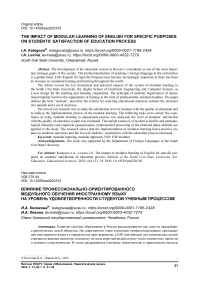The impact of modular learning of English for specific purposes on students’ satisfaction of education process
Автор: Kolegova I.A., Levina I.A.
Рубрика: Непрерывное образование в течение жизни. Образование разных уровней
Статья в выпуске: 1 т.14, 2022 года.
Бесплатный доступ
The development of the education system in Russia is considered as one of the most important strategic goals of the society. The professionalization of teaching a foreign language at the universities is a global trend. ESP (English for Specific Purposes) has become increasingly important as there has been an increase in vocational training and learning throughout the world. The article reveals the key theoretical and practical aspects of the system of modular learning in the South Ural State University, the Higher School of Electronic Engineering and Computer Science, as a new design for the teaching and learning cooperation. The principle of modular organization of educational material involves the organization of training in the form of professionally-oriented modules. The paper defines the term “module”, describes the criteria for selecting educational material, outlines the structure of a module and a set of exercises. The aim of our research was to study the satisfaction level of students with the quality of education and to analyze the implementation process of the modular learning. The following tasks were solved: the experience of using modular learning in educational process was analyzed, the level of students’ satisfaction with the quality of education system was evaluated. Theoretical (analysis of modern scientific and methodological literature) and empirical (questionnaire, mathematical processing of the obtained data) methods are applied in the study. The research shows that the implementation of modular learning had a positive impact on students' outcomes and the level of students` satisfaction with the education process increased.
Modular learning, modular approach, esp, esp modules
Короткий адрес: https://sciup.org/147236480
IDR: 147236480 | УДК: 378.44 | DOI: 10.14529/ped220103
Список литературы The impact of modular learning of English for specific purposes on students’ satisfaction of education process
- Ahmed S.T.S. Communicative Competence in English as a Foreign Language: It's Meaning and the Pedagogical Considerations for its Development. The Creative Launcher, 2018, vol. 2. Available at: https://www.researchgate.net/publication/324392820.
- Alexio M.B. Teachers' attitudes of communicative language teaching use in Brazil. Unpublished MA thesis. West Virginia, US, West Virginia University Publ., 2003. Available at: https://researchrepository. wvu.edu/etd/719.
- Bell D. Help! I've been asked to teach a class on ESP! IATEFL Voices, 2002, iss. 169. Available at: http://www.iatefl.org/content/newsletter/169.php (accessed 29.04.2009).
- Brown G., Atkins M. Effective Teaching in Higher Education. London, Routledge Publ., 1991. 254 p.
- Dastenova F. The Role of Module technology in Teaching Sequence of Time in the English Language. Young Scientist, 2017, vol. 23 (157), pp. 300-301.
- Dudley-Evans T. English for Specific Purposes. The Cambridge Guide to TESOL, Cambridge: Cambridge University Press Publ., 2001. 301 p.
- Garnham C., Kaleta R. Introduction to Hybrid Courses. Teaching with Technology Today, 2002, vol. 8, no. 6. Available at: http://www.uwsa.edu/ttt/articles/garnham.htm.
- Gil A. The Role of the Internet in Self-Study. Society. Integration. Education. Proceedings of the International Scientific Conference, 2015, vol. 4, pp. 393-404.
- Harding K. English for Specific Purposes. Oxford, Oxford University Press Publ., 2007. 184 p.
- Ibyatova L., Oparina K., Rakova E. Modular Approach to Teaching and Learning Grammar in Technical Universities Society. Integration. Education. Proceedings of the International Scientific Conference, 2018, vol. 1, pp. 139-148. Available at: https://www.researchgate.net/publication/325368627.
- Johnson A.L. Teaching Creative Problem Solving and Applied Reasoning Skills: A Modular Approach. Legal Education, California Western Law Review, 1998, vol. 34, iss. 2, pp. 389-396.
- Knight P.T. Being a Teacher in Higher Education. Buckingham, Society for Research into Higher Education & Open University Press Publ., 2002. 245 p.
- Nuttall C. Teaching Reading Skills in a foreign language. Oxford: Heinemann Publ., 1996. 292 p.
- Prauzner T. Analysis of the Results of the Pedagogical Research and Eeg in the Aspect of Effective Modern Teaching Aids in the Technical Education. Society. Integration. Education. Proceedings of the International Scientific Conference, 2015, vol. 4.414, pp. 480-489. Available at: https://www. researchgate.net/publication/277887350. DOI: 10.17770/sie2015vol4.414
- Richards J. Communicative Language Teaching Today. Cambridge University Press Publ., 2006. 52 p.
- Rudnitsky A. Course Design: A Guide to Curriculum Development for Teachers. New York: Longman Publ., 2001. 271 p.
- Sadiq S., Zamir Sh. Effectiveness of Modular Approach in Teaching at University Level. Journal of Education and Practice, 2014, vol. 5, no. 17. Available at: http://www.iiste.org/book.
- Spada N. Communicative Language Teaching: Current Status and Future Prospects. International Hand Book of English Language Teaching (Part I). New York, Springer Publ., 2007. 87 p.


